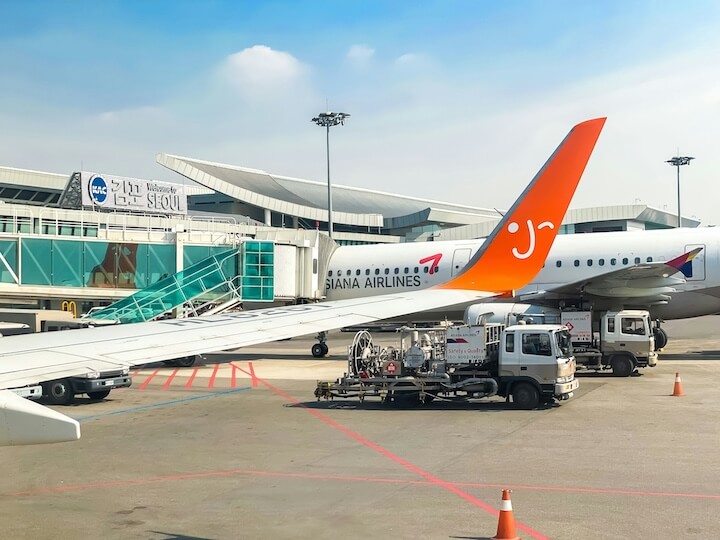Explore the ease of traveling to South Korea with the K-ETA, a streamlined electronic travel authorization for visa-exempt visitors. Whether you’re from the US, UK, EU, or one of over 100 eligible countries, K-ETA simplifies your journey with fast application processing, no need for physical paperwork, and the flexibility of multiple entries. Get ready for a hassle-free South Korean adventure.
What is K-ETA?
The Korea Electronic Travel Authorization (K-ETA) is an electronic travel authorization that pre-screens and approves visa-exempt foreign visitors for entry into South Korea. It’s a digital system designed to streamline the entry process for travelers, ensuring a more efficient and secure visit.
Unlike a traditional visa, the K-ETA does not require a visit to a consulate or embassy, nor does it involve a physical stamp or sticker in a passport. Instead, applicants can complete the entire process online, from application to approval, making it a convenient and time-saving option for travelers.
Differences between K-ETA and Traditional Visas
There are several key differences between the K-ETA and traditional visas.
1. Application Process
K-ETA applications are entirely online, requiring only a valid passport and a few personal and travel details. Traditional visas often require an appointment at a consulate or embassy, completion of extensive paperwork, and potentially an in-person interview.
2. Physical Documentation
Traditional visas typically result in a visa sticker or stamp in the applicant’s passport. In contrast, the K-ETA is entirely electronic; once approved, the authorization is linked digitally to the passport number, and travelers can proceed with their journey to South Korea without needing any physical evidence of their K-ETA.
3. Purpose and Duration
The K-ETA is intended for short-term visitors, such as tourists, business travelers, or those attending conferences and cultural events. It usually allows for a stay of up to 90 days, depending on the traveler’s nationality. Traditional visas can cover a wider range of purposes, including longer stays, work, and study, with different conditions and durations of stay.
4. Processing Time and Fees
The K-ETA boasts a faster processing time, with approvals often granted within hours to a few days. It also typically has a lower application fee compared to traditional visa processes, which can be more costly and time-consuming due to the additional administrative procedures involved.
Who can apply for K-ETA
The Korea Electronic Travel Authorization (K-ETA) system has been made available to nationals from over 100 countries, facilitating their visa-free entry into South Korea.
The K-ETA system is primarily aimed at countries previously granted visa exemption or waiver status by South Korea. It’s important for travelers to check the official K-ETA website or consult with the South Korean embassy or consulate in their countries for the most current list and any updates to eligibility requirements.

K-ETA Eligible Countries
The list of countries eligible for the K-ETA includes, but is not limited to, the United States, Canada, Australia, New Zealand, the United Kingdom, and most European Union countries. Nationals from these regions can apply for a K-ETA instead of a traditional visa for short-term stays, typically up to 90 days, for purposes such as tourism, business, visiting family, or participating in cultural or sporting events.
K-ETA for US Citizens
As part of the visa waiver program, the K-ETA allows American travelers to enter South Korea for tourism, business, or transit purposes without the need for a traditional visa. This streamlined process not only saves time but also simplifies pre-travel preparations. Between 1 April 2023 to 31 December 2024, US citizens can visit South Korea without K-ETA thanks to the temporary K-ETA exemptions. The details about K-ETA exemptions will be provided below.
Recent Additions or Exceptions
To ensure accuracy and compliance with current travel regulations, it is crucial for potential travelers to refer to the official K-ETA portal (https://www.k-eta.go.kr/) or contact relevant South Korean diplomatic missions for the latest information. The official portal provides detailed guidance, including a full list of eligible countries, application procedures, fees, and any recent updates to the K-ETA program. Keeping informed about these aspects is essential for a smooth travel experience to South Korea.
Countries with K-ETA Exemptions
These K-ETA exemption countries enjoy visa-free or visa waiver agreements with South Korea, allowing their citizens to travel without the need for a K-ETA under specific conditions. It’s crucial for travelers to check the latest list of K-ETA exemption countries before planning their trip, as this list can evolve based on international agreements and policies.
There has been a significant update that will make traveling to South Korea more accessible for many international visitors. The Korean Government has announced a temporary exemption from the Korea Electronic Travel Authorization (K-ETA) requirement for passport holders from 22 countries, Australia, New Zealand, some European countries, and the US. This exemption is effective from 1 April 2023 to 31 December 2024 (Korean time).
Here is the full list of countries temporarily exempt from the K-ETA requirement.
- Australia
- Austria
- Belgium
- Canada
- Denmark
- Finland
- France
- Germany
- Hong Kong
- Italy
- Japan
- Macao
- Netherlands
- New Zealand
- Norway
- Poland
- Singapore
- Spain
- Sweden
- Taiwan
- the UK
- the US (including Guam)
This temporary measure, is part of a broader initiative to welcome more tourists to South Korea. Typically, out of 110 visa-free countries required to have a K-ETA for entry into South Korea, these 22 countries will enjoy simplified access.
For those from countries not on the exemption list, the K-ETA process remains straightforward and can be completed online at least 72 hours before departure.
Please remember, existing K-ETAs will retain their validity until their original expiration date, two years from issuance, and no refunds will be issued for those already holding a K-ETA.
This exemption is a fantastic opportunity for travelers from these countries to explore South Korea more easily. Whether you’re drawn to the historical landmarks, vibrant cities, serene landscapes, or the cutting-edge technology and fashion scenes, South Korea has something special to offer.
For the most current information and updates on the K-ETA and travel to South Korea, please visit the official K-ETA website.
Benefits of K-ETA
The Korea Electronic Travel Authorization (K-ETA) introduces several benefits for international travelers looking to visit South Korea, significantly simplifying the entry process and enhancing the overall travel experience. Below are the key advantages of obtaining a K-ETA.

Simplified Entry Process into South Korea
1. Convenience
The K-ETA application process is entirely online, allowing travelers to apply for entry permission from the comfort of their home or office without the need to visit a South Korean embassy or consulate. This digital approach saves time and simplifies the preparation for a trip to South Korea.
2. Efficiency
The K-ETA system is designed for quick processing, with most applications reviewed and decided upon within 24 to 72 hours. This rapid turnaround ensures that travelers can finalize their travel plans well in advance of their departure date.
3. Reduced Paperwork
Since the K-ETA is electronically linked to the traveler’s passport, there’s no need for additional paperwork or physical evidence of the authorization. Upon arrival in South Korea, immigration checks are expedited, as the K-ETA has already pre-screened travelers.
4. Cost-Effective
The fee for a K-ETA application is 10,000 Korean Won (approximately USD$8-10), which is generally lower than the cost associated with obtaining a traditional visa, making it a cost-effective option for eligible travelers.
Duration and Validity of the K-ETA
Long-Term Validity
Once approved, a K-ETA is valid for two years or until the associated passport expires, whichever comes first. This long-term validity offers flexibility for travelers who plan to visit South Korea multiple times within this period, as they do not need to reapply for each trip.
Multiple Entries
The K-ETA allows for multiple entries into South Korea during its validity period, making it an excellent option for frequent travelers, business visitors, and tourists planning to explore the region extensively.
Stay Duration
Each entry to South Korea under a K-ETA typically allows for a stay of up to 90 days (depending on your country, it can be less than 90 days) for tourism, business, visiting friends or relatives, or participation in cultural, sports, or academic activities. The exact duration of stay may vary based on the traveler’s nationality, so it’s important to verify specific conditions through official sources.
How to apply for K-ETA
You can apply for K-ETA in K-ETA website.
We’ll explore how to apply for K-ETA and processing time and procedure in the other blog post.
In summary, the K-ETA offers a streamlined, efficient, and flexible approach to entering South Korea for eligible travelers. Its benefits extend beyond mere convenience, fostering a more accessible and welcoming environment for international visitors while maintaining the security and integrity of South Korea’s immigration processes.
If you found this guide on Korea’s travel visa insightful, be sure to explore our other posts dedicated to traveling in Korea below.
Purchasing a Prepaid SIM Card in Korea: Online vs. Airport Options
10 Must-Have Korean Apps for Your Upcoming Trip to Korea
Survival Korean: Essential Korean words and phrases for living in Korea
